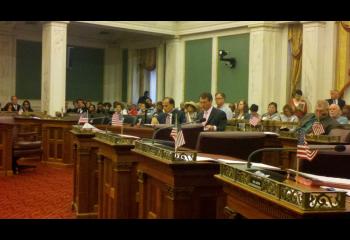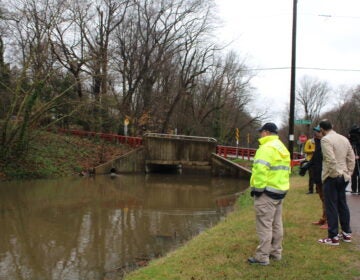Council geographically expands ordinance allowing for the relocation of billboards, other structures condemned for I-95 expansion

Owners of billboards and other structures condemned to make way for the expansion of I-95 from Allegheny Avenue north to Rhawn Street can now relocate them with an over-the-counter permit.
Those who own condemned property along the highway south of Allegheny, down to Arch Street, have had this option since last year. Former councilwoman Joan Krajewski kept District 6 out of the original resolution. Her successor, District 6 Councilman Bobby Henon, introduced the legislation passed by council Thursday, which adds the district in.
Proponents of the bill, including representatives of the outdoor advertising industry, have said there are only four billboards that would be relocated under the new ordinance, and none would be placed in a residential area. Saving the boards meant saving tax revenue and jobs, they said. They have noted at previous meetings that former governor Ed Rendell asked them to work on a bill, and that the city and PennDOT both had a role in crafting the legislation.
“This is a win, win, win,” said attorney George Kroculick, who represents ClearChannel and CBS Outdoor, after the hearing. He and other industry representatives attended the meeting, but did not testify. “PennDOT, the city, and the billboard industry all had a huge stake in this.”
PennDOT District 6 Executive Les Toaso said PennDOT worked with the city and the billboard companies on the bill that was passed last year, but had no involvement with the Henon amendment.
The original bill introduced by former District 1 councilman Frank DiCicco had language in it that concerned PennDOT, Toaso said, so PennDOT “put certain things in there that restricted them from doing what they originally wanted to do in the bill” in order to make sure nothing in the ordinance restricted PennDOT’s rights or regulations, or conflicted with federal highway regulations, he said.
Toaso said PennDOT and the billboard industry have had a disagreement about the money PennDOT owed billboard owners for condemning billboards: Everyone agreed PennDOT owed owners compensation for relocating the boards, but the industry also wanted “just compensation” for the income each condemned board could have made.
Allowing the relocation of billboards means that second issue is off the table, Toaso said. “It will save us time,” Toaso said, because this “ends the need for any further discussion, or any litigation that they could bring against us, that could hold up the process.”
Opponents of the bill, including Scenic Philadelphia – the organization formerly known as SCRUB – and the Tacony Civic Association – have said they would not have fought an ordinance that was guaranteed to only impact those four billboards. They worry that future PennDOT plans could impact additional billboards that could be more problematic for neighbors. They have also said they would prefer that each billboard relocation be considered individually, through the regular application process that the bill makes unnecessary. Neither TCA nor Scenic Philadelphia testified, and PlanPhilly saw no representatives from either organization at Council. See previous coverage.
Scenic Philadelphia has mounted a challenge against the existing ordinance, but its appeal of the first three permits granted by L&I to Steen was denied by the Zoning Board of Adjustment. The organization plans to appeal to Commonwealth Court. Learn more about the case here.
Reach the reporter at kgates@planphilly.com.
WHYY is your source for fact-based, in-depth journalism and information. As a nonprofit organization, we rely on financial support from readers like you. Please give today.






